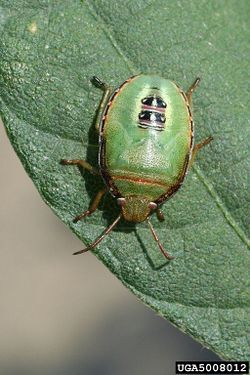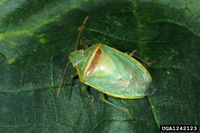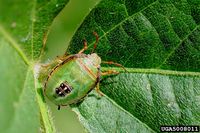Difference between revisions of "Piezodorus guildinii"
| (3 intermediate revisions by the same user not shown) | |||
| Line 1: | Line 1: | ||
| − | {{ | + | {{TaxLinks|LnkPiezodorus}} |
| − | {{ | + | {{LiteratureDBX|{{PAGENAME}}|1312|browse,Ccountrylnk,Pcrops,AbenefialsN}} |
[[File:Piezodorus guildinii 01.jpg|250px|thumb|''Piezodorus guildinii'' (click on image to enlarge it)<br/>Author(s): Russ Ottens, University of Georgia<br/>Source: [http://commons.wikimedia.org/wiki/File:Piezodorus_guildinii_01.jpg Wikimedia Commons]]] | [[File:Piezodorus guildinii 01.jpg|250px|thumb|''Piezodorus guildinii'' (click on image to enlarge it)<br/>Author(s): Russ Ottens, University of Georgia<br/>Source: [http://commons.wikimedia.org/wiki/File:Piezodorus_guildinii_01.jpg Wikimedia Commons]]] | ||
| − | <font color="#800000">'''''Piezodorus guildinii'''''</font> (Westwood, 1837) - (red-banded stink bug) | + | <font color="#800000">'''''Piezodorus guildinii'''''</font> (Westwood, 1837) - (red-banded stink bug) |
| − | is found in the Americas from Argentina to the southern United Sates and feeds on the pods of legumes like soybean, alfalfa or pigeon pea. It is particular important in South American soybean fields and has also become more common in North America. The bug attacks the developing pods and inserts its stylet directly into the young seeds. The pods then become deformed or infected by fungi. | + | |
| + | The stink bug is found in the Americas from Argentina to the southern United Sates and feeds on the pods of legumes like soybean, alfalfa or pigeon pea. It is particular important in South American soybean fields and has also become more common in North America. The bug attacks the developing pods and inserts its stylet directly into the young seeds. The pods then become deformed or infected by fungi. Other plants like radish or lupin may also be attacked. | ||
| + | |||
| + | The life cycle from egg, through 5 nymphal stages, to adult lasts around 6 weeks. There are 5-8 generations per year. Control by insecticides is difficult and requires repeated applications of broad-spectrum pesticides. Development of resistant soybean cultivars is in progress. | ||
{{VN | {{VN | ||
|en=red-banded stink bug | |en=red-banded stink bug | ||
| Line 9: | Line 12: | ||
|pt=percevejo-verde-pequeno-da-soja | |pt=percevejo-verde-pequeno-da-soja | ||
}} | }} | ||
| + | The adult is 8-10 mm long, green with a transverse, horizontal band across the posterior part of the pronotum. Nymphs have a characteristic black mark on the abdomen containing white dots. | ||
| + | |||
| + | |||
<gallery widths=200px caption="Other images of Piezodorus guildinii (Wikimedia Commons - click to enlarge)"> | <gallery widths=200px caption="Other images of Piezodorus guildinii (Wikimedia Commons - click to enlarge)"> | ||
File:Piezodorus guildinii 03.jpg | File:Piezodorus guildinii 03.jpg | ||
Latest revision as of 19:17, 17 August 2022
| Literature database |
|---|
| 97 articles sorted by: |
| • year (descending) |
| • research topics |
| • countries/regions |
| • host plants |
| • list of natural enemies |

Author(s): Russ Ottens, University of Georgia
Source: Wikimedia Commons
Piezodorus guildinii (Westwood, 1837) - (red-banded stink bug)
The stink bug is found in the Americas from Argentina to the southern United Sates and feeds on the pods of legumes like soybean, alfalfa or pigeon pea. It is particular important in South American soybean fields and has also become more common in North America. The bug attacks the developing pods and inserts its stylet directly into the young seeds. The pods then become deformed or infected by fungi. Other plants like radish or lupin may also be attacked.
The life cycle from egg, through 5 nymphal stages, to adult lasts around 6 weeks. There are 5-8 generations per year. Control by insecticides is difficult and requires repeated applications of broad-spectrum pesticides. Development of resistant soybean cultivars is in progress.
| Vernacular names | |
|---|---|
| • English: | red-banded stink bug |
| • Español: | chinche verde pequeña chinche de la alfalfa |
| • Português: | percevejo-verde-pequeno-da-soja |
The adult is 8-10 mm long, green with a transverse, horizontal band across the posterior part of the pronotum. Nymphs have a characteristic black mark on the abdomen containing white dots.
- Other images of Piezodorus guildinii (Wikimedia Commons - click to enlarge)

